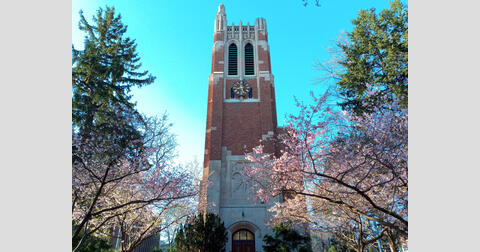MSU trustees back off from vendor lobbying proposal
Resolution called on contractors to oppose photo-ID measure on November 2022 ballot
The trustees of Michigan State University were slated at their Sept. 9 meeting to consider a resolution to call on MSU’s vendors and contractors to oppose a proposal on the November ballot to reform the state’s voting laws. The resolution also urged vendors to change their political donations and lobby legislators on the measure.
The resolution labeled “Accountability of University Vendors Funding Voter Suppression,” was originally on the agenda for the board’s Sept. 9 meeting, though it is no longer there.
Voter suppression, in this case, is the term that opponents sometimes use to describe voter ID laws and other voting security measures. The resolution specifically calls out the Secure MI Vote initiative (official language here; third-party description here), which would alter the Michigan Constitution by placing in it a photo ID requirement and making other changes to voting procedures.
The resolution justified its position on the grounds that MSU promotes voting, social justice and an end to systemic racism. The Secure MI Vote initiative is one of many “voter suppression bills,” it said. Such bills and laws “make it disproportionately harder for students, as well as Black, brown and working-class people to vote by design,” the resolution added.
Businesses that have contracts with MSU are free to make political donations as they see fit, according to the resolution, but some of those contributions benefit politicians who have and continue to support voter suppression efforts.
The university’s contractors, the resolution concludes, should lobby elected officials to oppose such bills and adjust their donations accordingly.
MSU would likely be acting in an unconstitutional way if it pressures contractors to take a stand on a ballot measure, said Steve Delie, an attorney and public records expert at the Mackinac Center for Public Policy. Delie cited O’Hare Truck Service, Inc. v. City of Northlake, a 1996 case that reached the U.S. Supreme Court. O’Hare, a towing company, had long been a contractor of the Northlake, Illinois, city government. The city ended the relationship after O’Hare supported one of the mayor’s rivals.
Delie said the MSU resolution would require the university’s contractors to send a specific message to lawmakers — compelled speech. “It further calls on contractors to align their political support and financial contributions behind candidates with similar viewpoints,” he said. “That chills contractors from exercising their First Amendment rights, and is a prior restraint.”
Michigan taxpayers gave $357.9 million in direct appropriations to MSU during the current fiscal year, according to the House Fiscal Agency, or $90 per household.
Michigan Capitol Confidential is the news source produced by the Mackinac Center for Public Policy. Michigan Capitol Confidential reports with a free-market news perspective.


 Michigan Tech scores No. 4 rank for free speech on campus
Michigan Tech scores No. 4 rank for free speech on campus
 Michigan University Hospital, union feud over parking spots
Michigan University Hospital, union feud over parking spots
 U-M threatened pro-Palestinian students, union alleges
U-M threatened pro-Palestinian students, union alleges